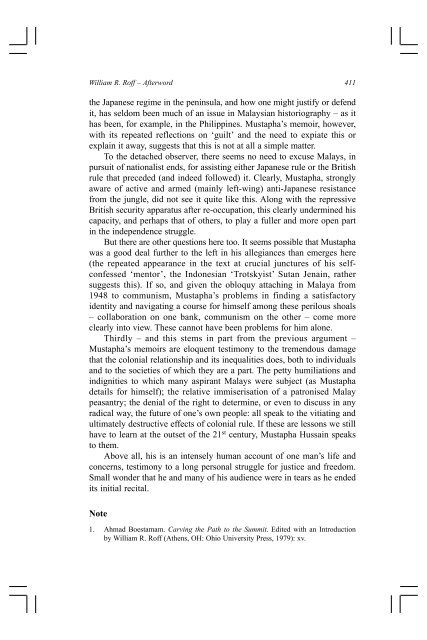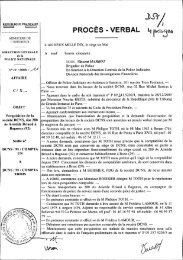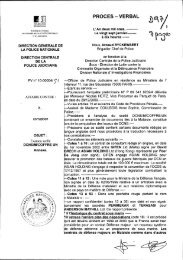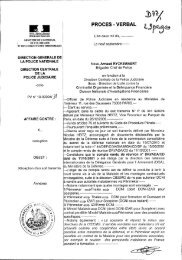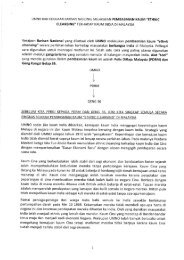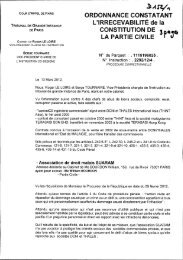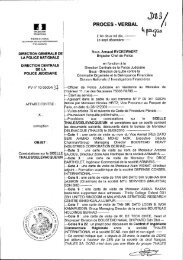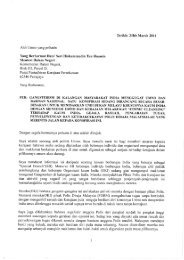William R. Roff – Afterword 411 the Japanese regime in the peninsula, and how one might justify or defend it, has seldom been much of an issue in <strong>Malaysia</strong>n historiography – as it has been, for example, in the Philippines. Mustapha’s memoir, however, with its repeated reflections on ‘guilt’ and the need to expiate this or explain it away, suggests that this is not at all a simple matter. To the detached observer, there seems no need to excuse Malays, in pursuit of nationalist ends, for assisting either Japanese rule or the British rule that preceded (and indeed followed) it. Clearly, Mustapha, strongly aware of active and armed (mainly left-wing) anti-Japanese resistance from the jungle, did not see it quite like this. Along with the repressive British security apparatus after re-occupation, this clearly undermined his capacity, and perhaps that of others, to play a fuller and more open part in the independence struggle. But there are other questions here too. It seems possible that Mustapha was a good deal further to the left in his allegiances than emerges here (the repeated appearance in the text at crucial junctures of his selfconfessed ‘mentor’, the Indonesian ‘Trotskyist’ Sutan Jenain, rather suggests this). If so, and given the obloquy attaching in Malaya from 1948 to communism, Mustapha’s problems in finding a satisfactory identity and navigating a course for himself among these perilous shoals – collaboration on one bank, communism on the other – come more clearly into view. These cannot have been problems for him alone. Thirdly – and this stems in part from the previous argument – Mustapha’s memoirs are eloquent testimony to the tremendous damage that the colonial relationship and its inequalities does, both to individuals and to the societies of which they are a part. The petty humiliations and indignities to which many aspirant Malays were subject (as Mustapha details for himself); the relative immiserisation of a patronised Malay peasantry; the denial of the right to determine, or even to discuss in any radical way, the future of one’s own people: all speak to the vitiating and ultimately destructive effects of colonial rule. If these are lessons we still have to learn at the outset of the 21 st century, Mustapha Hussain speaks to them. Above all, his is an intensely human account of one man’s life and concerns, testimony to a long personal struggle for justice and freedom. Small wonder that he and many of his audience were in tears as he ended its initial recital. Note 1. Ahmad Boestamam. Carving the Path to the Summit. Edited with an Introduction by William R. Roff (Athens, OH: Ohio University Press, 1979): xv.
412 Index Index Abbas bin Haji Alias, Vol. Captain Dr., 164, 178-9, 221, 227, 235, 238, 327 A. Samad Ismail, Tan Sri, 282, 341 A. Talib bin Haji Ahmad, 157, 176-7, 250, 277, 300-1 Abdul Hadi bin Haji Hassan, 145 Abdul Hamid Abdul, 143, 329, 332, 370 Abdul Hamid bin Bidin, Gen. Tan Sri, 238 Abdul Hamid Khan, Vol. Captain, 85-6, 183-4 Abdul Kadir Adabi, 138, 143, 158, 160, 175, 181, 193, 211, 236, 244, 253-7, 272 Abdul Karim Rashid, 137, 141, 151, 154- 5, 159, 210, 246, 255, 259, 336 Abdul Malek Hanafiah, 221, 401 Abdul Rahim Kajai, 114, 147-8, 159, 207 Abdul Rahman Rahim, 143, 162, 335, 393, 398 Abdul Rahman Tambi, 138, 142, 189, 193 Abdul Samad Ahmad, 137, 142, 210 Abdul Majid Haji Mohamed, 143 Abdul Wahab bin Toh Muda Abdul Aziz, 5 Abdul Wahid bin Judin, Lt, 228, 230 Abdullah C.D., 143, 330, 337, 339, 348, 351 Abdullah Kamil, 137, 142, 148, 210 Abdullah Zawawi, 365 Abu Bakar Al-Baqir, Ustaz, 141, 169, 276, 278, 335, 393-7 Abu Bakar bin Baginda, 130 Abu Bakar bin Manan, 75, 78 Acheh, 1, 32, 48, 127, 148-9 Achih bin Haji Masud, 143 Adams, T.S., 102, 128, 155-6, 323 Adlan Mustapha, 397 Adelain Mustapha, 318, 357, 367 Adnan Sidek, Lt, 216 Agricultural Assistant (AA), 5, 72, 83, 94, 99, 101-4, 183, 237, 299 Agricultural Officers, 72, 74, 83, 94-5 Ahmad bin Abdul Rahman, 329, 370 Ahmad bin Mohd Amin, 142, 161, 189, 193, 245, 403 Ahmad Boestamam, Datuk, 138, 141-2, 162, 210, 221, 239, 248, 250-2, 258, 270, 280, 322, 326, 330, 337, 341, 344-5, 349, 362-3, 398, 410-1 Ahmad Shafik, 142, 169 Ahmad Shukri, 175 Ahmed bin Haji Hussain, 20-1, 24, 37, 43, 51, 68, 70 Ainuddin bin Abdul Wahid, Tan Sri Haji, 400 Aishah Ghani, Tan Sri Hajah, 129, 350, 356 Aishahtun, 1 Al Ikhwan, 70, 124 Alli bin Haji Hussain, 1, 4-5, 49-50, 60-1, 74, 241, 252, 259 Alliance, The, 387-92 Allied Forces, 116, 244, 269, 271, 273, 284, 287, 289 All-Malayan Council of Joint Action (AMCJA), 156, 330, 341-9 Al-Mashoor Arabic School, 67 Amat Juhari Moain, Prof., 161, 207, 283, 286 America/American, 100, 153, 247, 289- 90, 355-6, 385 Aminuddin bin Jumain, 142 Anderson School in Ipoh, 157, 171, 176 API (Angkatan Pemuda Insaf or Generation of Aware Youth), 330-2, 337, 341, 345, 349, 363-4, 371-2 AWAS (Angkatan Wanita Sedar or Generation of Conscious Women), 341, 345, 371 Arab/Arabic, 1, 26, 37, 42, 52, 62-5, 68- 9, 124, 162 Ariffin bin Buyung, 291
- Page 2:
MALAY NATIONALISM BEFORE UMNO: THE
- Page 5 and 6:
Published and distributed by UTUSAN
- Page 7 and 8:
vi Contents 28. KRIS (July-August 1
- Page 9 and 10:
Acknowledgements This abridged and
- Page 11 and 12:
Introduction Insun Sony Mustapha Th
- Page 13 and 14:
xii Introduction Perak throne. This
- Page 15 and 16:
xiv Introduction All-Malayan Counci
- Page 17 and 18:
Glossary alir - floating board with
- Page 19 and 20:
xviii Glossary ilmu pengasih - chan
- Page 21 and 22:
xx Glossary rojak - mixed sliced ve
- Page 23 and 24:
Circa 1939 - Students and teaching
- Page 25 and 26:
1942 - Mustapha’s older brother A
- Page 27 and 28:
1953 - Mustapha and his father, Haj
- Page 29 and 30:
1980s - Mustapha with Malay nationa
- Page 31 and 32:
1985 - Mustapha, ever cheerful, cle
- Page 33 and 34:
2 Memoirs of Mustapha Hussain of Ma
- Page 35 and 36:
4 Memoirs of Mustapha Hussain When
- Page 37 and 38:
6 Memoirs of Mustapha Hussain 2 Mat
- Page 39 and 40:
8 Memoirs of Mustapha Hussain had m
- Page 41 and 42:
10 Memoirs of Mustapha Hussain poin
- Page 43 and 44:
12 Memoirs of Mustapha Hussain Germ
- Page 45 and 46:
14 Memoirs of Mustapha Hussain The
- Page 47 and 48:
16 Memoirs of Mustapha Hussain Moth
- Page 49 and 50:
18 Memoirs of Mustapha Hussain was
- Page 51 and 52:
20 Memoirs of Mustapha Hussain 4 Ka
- Page 53 and 54:
22 Memoirs of Mustapha Hussain reme
- Page 55 and 56:
24 Memoirs of Mustapha Hussain clea
- Page 57 and 58:
26 Memoirs of Mustapha Hussain 5 Re
- Page 59 and 60:
28 Memoirs of Mustapha Hussain Duri
- Page 61 and 62:
30 Memoirs of Mustapha Hussain youn
- Page 63 and 64:
32 Memoirs of Mustapha Hussain on a
- Page 65 and 66:
34 Memoirs of Mustapha Hussain Esta
- Page 67 and 68:
36 Memoirs of Mustapha Hussain soph
- Page 69 and 70:
38 Memoirs of Mustapha Hussain Mala
- Page 71 and 72:
40 Memoirs of Mustapha Hussain For
- Page 73 and 74:
42 Memoirs of Mustapha Hussain fond
- Page 75 and 76:
44 Memoirs of Mustapha Hussain agai
- Page 77 and 78:
46 Memoirs of Mustapha Hussain my h
- Page 79 and 80:
48 Memoirs of Mustapha Hussain down
- Page 81 and 82:
50 Memoirs of Mustapha Hussain sent
- Page 83 and 84:
52 Memoirs of Mustapha Hussain all
- Page 85 and 86:
54 Memoirs of Mustapha Hussain alon
- Page 87 and 88:
56 Memoirs of Mustapha Hussain but
- Page 89 and 90:
58 Memoirs of Mustapha Hussain I an
- Page 91 and 92:
60 Memoirs of Mustapha Hussain othe
- Page 93 and 94:
62 Memoirs of Mustapha Hussain 10 O
- Page 95 and 96:
64 Memoirs of Mustapha Hussain One
- Page 97 and 98:
66 Memoirs of Mustapha Hussain me d
- Page 99 and 100:
68 Memoirs of Mustapha Hussain rock
- Page 101 and 102:
70 Memoirs of Mustapha Hussain repu
- Page 103 and 104:
72 Memoirs of Mustapha Hussain 11 L
- Page 105 and 106:
74 Memoirs of Mustapha Hussain a pa
- Page 107 and 108:
76 Memoirs of Mustapha Hussain and
- Page 109 and 110:
78 Memoirs of Mustapha Hussain One
- Page 111 and 112:
80 Memoirs of Mustapha Hussain Well
- Page 113 and 114:
82 Memoirs of Mustapha Hussain A vo
- Page 115 and 116:
84 Memoirs of Mustapha Hussain to s
- Page 117 and 118:
86 Memoirs of Mustapha Hussain They
- Page 119 and 120:
88 Memoirs of Mustapha Hussain cons
- Page 121 and 122:
90 Memoirs of Mustapha Hussain with
- Page 123 and 124:
92 Memoirs of Mustapha Hussain I fo
- Page 125 and 126:
94 Memoirs of Mustapha Hussain Five
- Page 127 and 128:
96 Memoirs of Mustapha Hussain 13 M
- Page 129 and 130:
98 Memoirs of Mustapha Hussain I re
- Page 131 and 132:
100 Memoirs of Mustapha Hussain “
- Page 133 and 134:
102 Memoirs of Mustapha Hussain I d
- Page 135 and 136:
104 Memoirs of Mustapha Hussain Mr
- Page 137 and 138:
106 Memoirs of Mustapha Hussain at
- Page 139 and 140:
108 Memoirs of Mustapha Hussain inc
- Page 141 and 142:
110 Memoirs of Mustapha Hussain Mr
- Page 143 and 144:
112 Memoirs of Mustapha Hussain 15
- Page 145 and 146:
114 Memoirs of Mustapha Hussain att
- Page 147 and 148:
116 Memoirs of Mustapha Hussain rec
- Page 149 and 150:
118 Memoirs of Mustapha Hussain 16
- Page 151 and 152:
120 Memoirs of Mustapha Hussain fly
- Page 153 and 154:
122 Memoirs of Mustapha Hussain Off
- Page 155 and 156:
124 Memoirs of Mustapha Hussain eve
- Page 157 and 158:
126 Memoirs of Mustapha Hussain was
- Page 159 and 160:
128 Memoirs of Mustapha Hussain an
- Page 161 and 162:
130 Memoirs of Mustapha Hussain Min
- Page 163 and 164:
132 Memoirs of Mustapha Hussain lef
- Page 165 and 166:
134 Memoirs of Mustapha Hussain pla
- Page 167 and 168:
136 Memoirs of Mustapha Hussain par
- Page 169 and 170:
138 Memoirs of Mustapha Hussain I w
- Page 171 and 172:
140 Memoirs of Mustapha Hussain At
- Page 173 and 174:
142 Memoirs of Mustapha Hussain cou
- Page 175 and 176:
144 Memoirs of Mustapha Hussain Not
- Page 177 and 178:
146 Memoirs of Mustapha Hussain Ibr
- Page 179 and 180:
148 Memoirs of Mustapha Hussain I r
- Page 181 and 182:
150 Memoirs of Mustapha Hussain Aft
- Page 183 and 184:
152 Memoirs of Mustapha Hussain Oth
- Page 185 and 186:
154 Memoirs of Mustapha Hussain sho
- Page 187 and 188:
156 Memoirs of Mustapha Hussain ins
- Page 189 and 190:
158 Memoirs of Mustapha Hussain He
- Page 191 and 192:
160 Memoirs of Mustapha Hussain Ona
- Page 193 and 194:
162 Memoirs of Mustapha Hussain 9.
- Page 195 and 196:
164 Memoirs of Mustapha Hussain 20
- Page 197 and 198:
166 Memoirs of Mustapha Hussain our
- Page 199 and 200:
168 Memoirs of Mustapha Hussain Aft
- Page 201 and 202:
170 Memoirs of Mustapha Hussain we
- Page 203 and 204:
172 Memoirs of Mustapha Hussain Moh
- Page 205 and 206:
174 Memoirs of Mustapha Hussain hea
- Page 207 and 208:
176 Memoirs of Mustapha Hussain the
- Page 209 and 210:
178 Memoirs of Mustapha Hussain col
- Page 211 and 212:
180 Memoirs of Mustapha Hussain 10.
- Page 213 and 214:
182 Memoirs of Mustapha Hussain 21
- Page 215 and 216:
184 Memoirs of Mustapha Hussain was
- Page 217 and 218:
186 Memoirs of Mustapha Hussain Maj
- Page 219 and 220:
188 Memoirs of Mustapha Hussain fet
- Page 221 and 222:
190 Memoirs of Mustapha Hussain col
- Page 223 and 224:
192 Memoirs of Mustapha Hussain I t
- Page 225 and 226:
194 Memoirs of Mustapha Hussain cra
- Page 227 and 228:
196 Memoirs of Mustapha Hussain Aft
- Page 229 and 230:
198 Memoirs of Mustapha Hussain 22
- Page 231 and 232:
200 Memoirs of Mustapha Hussain I c
- Page 233 and 234:
202 Memoirs of Mustapha Hussain not
- Page 235 and 236:
204 Memoirs of Mustapha Hussain did
- Page 237 and 238:
206 Memoirs of Mustapha Hussain ing
- Page 239 and 240:
208 Memoirs of Mustapha Hussain 23
- Page 241 and 242:
210 Memoirs of Mustapha Hussain ite
- Page 243 and 244:
212 Memoirs of Mustapha Hussain hap
- Page 245 and 246:
214 Memoirs of Mustapha Hussain to
- Page 247 and 248:
216 Memoirs of Mustapha Hussain mil
- Page 249 and 250:
218 Memoirs of Mustapha Hussain Far
- Page 251 and 252:
220 Memoirs of Mustapha Hussain bro
- Page 253 and 254:
222 Memoirs of Mustapha Hussain was
- Page 255 and 256:
224 Memoirs of Mustapha Hussain oth
- Page 257 and 258:
226 Memoirs of Mustapha Hussain 24
- Page 259 and 260:
228 Memoirs of Mustapha Hussain Vis
- Page 261 and 262:
230 Memoirs of Mustapha Hussain bee
- Page 263 and 264:
232 Memoirs of Mustapha Hussain six
- Page 265 and 266:
234 Memoirs of Mustapha Hussain Sol
- Page 267 and 268:
236 Memoirs of Mustapha Hussain new
- Page 269 and 270:
238 Memoirs of Mustapha Hussain Cap
- Page 271 and 272:
240 Memoirs of Mustapha Hussain att
- Page 273 and 274:
242 Memoirs of Mustapha Hussain bre
- Page 275 and 276:
244 Memoirs of Mustapha Hussain 25
- Page 277 and 278:
246 Memoirs of Mustapha Hussain Bri
- Page 279 and 280:
248 Memoirs of Mustapha Hussain mom
- Page 281 and 282:
250 Memoirs of Mustapha Hussain Sut
- Page 283 and 284:
252 Memoirs of Mustapha Hussain Upo
- Page 285 and 286:
254 Memoirs of Mustapha Hussain Chi
- Page 287 and 288:
256 Memoirs of Mustapha Hussain acc
- Page 289 and 290:
258 Memoirs of Mustapha Hussain Boo
- Page 291 and 292:
260 Memoirs of Mustapha Hussain had
- Page 293 and 294:
262 Memoirs of Mustapha Hussain the
- Page 295 and 296:
264 Memoirs of Mustapha Hussain One
- Page 297 and 298:
266 Memoirs of Mustapha Hussain I a
- Page 299 and 300:
268 Memoirs of Mustapha Hussain 28
- Page 301 and 302:
270 Memoirs of Mustapha Hussain in
- Page 303 and 304:
272 Memoirs of Mustapha Hussain to
- Page 305 and 306:
274 Memoirs of Mustapha Hussain For
- Page 307 and 308:
276 Memoirs of Mustapha Hussain may
- Page 309 and 310:
278 Memoirs of Mustapha Hussain to
- Page 311 and 312:
280 Memoirs of Mustapha Hussain Wor
- Page 313 and 314:
282 Memoirs of Mustapha Hussain Kua
- Page 315 and 316:
284 Memoirs of Mustapha Hussain lon
- Page 317 and 318:
286 Memoirs of Mustapha Hussain bet
- Page 319 and 320:
288 Memoirs of Mustapha Hussain On
- Page 321 and 322:
290 Memoirs of Mustapha Hussain Gen
- Page 323 and 324:
292 Memoirs of Mustapha Hussain and
- Page 325 and 326:
294 Memoirs of Mustapha Hussain 30
- Page 327 and 328:
296 Memoirs of Mustapha Hussain sle
- Page 329 and 330:
298 Memoirs of Mustapha Hussain fir
- Page 331 and 332:
300 Memoirs of Mustapha Hussain Aft
- Page 333 and 334:
302 Memoirs of Mustapha Hussain wen
- Page 335 and 336:
304 Memoirs of Mustapha Hussain 31
- Page 337 and 338:
306 Memoirs of Mustapha Hussain dis
- Page 339 and 340:
308 Memoirs of Mustapha Hussain A C
- Page 341 and 342:
310 Memoirs of Mustapha Hussain cig
- Page 343 and 344:
312 Memoirs of Mustapha Hussain ret
- Page 345 and 346:
314 Memoirs of Mustapha Hussain for
- Page 347 and 348:
316 Memoirs of Mustapha Hussain tha
- Page 349 and 350:
318 Memoirs of Mustapha Hussain 32
- Page 351 and 352:
320 Memoirs of Mustapha Hussain be
- Page 353 and 354:
322 Memoirs of Mustapha Hussain all
- Page 355 and 356:
324 Memoirs of Mustapha Hussain tio
- Page 357 and 358:
326 Memoirs of Mustapha Hussain As
- Page 359 and 360:
328 Memoirs of Mustapha Hussain in
- Page 361 and 362:
330 Memoirs of Mustapha Hussain Mai
- Page 363 and 364:
332 Memoirs of Mustapha Hussain a f
- Page 365 and 366:
334 Memoirs of Mustapha Hussain pre
- Page 367 and 368:
336 Memoirs of Mustapha Hussain rub
- Page 369 and 370:
338 Memoirs of Mustapha Hussain not
- Page 371 and 372:
340 Memoirs of Mustapha Hussain thr
- Page 373 and 374:
342 Memoirs of Mustapha Hussain 5.
- Page 375 and 376:
344 Memoirs of Mustapha Hussain the
- Page 377 and 378:
346 Memoirs of Mustapha Hussain How
- Page 379 and 380:
348 Memoirs of Mustapha Hussain Wha
- Page 381 and 382:
350 Memoirs of Mustapha Hussain sta
- Page 383 and 384:
352 Memoirs of Mustapha Hussain nee
- Page 385 and 386:
354 Memoirs of Mustapha Hussain pro
- Page 387 and 388:
356 Memoirs of Mustapha Hussain sin
- Page 389 and 390:
358 Memoirs of Mustapha Hussain kno
- Page 391 and 392: 360 Memoirs of Mustapha Hussain the
- Page 393 and 394: 362 Memoirs of Mustapha Hussain 36
- Page 395 and 396: 364 Memoirs of Mustapha Hussain API
- Page 397 and 398: 366 Memoirs of Mustapha Hussain Maj
- Page 399 and 400: 368 Memoirs of Mustapha Hussain One
- Page 401 and 402: 370 Memoirs of Mustapha Hussain han
- Page 403 and 404: 372 Memoirs of Mustapha Hussain tim
- Page 405 and 406: 374 Memoirs of Mustapha Hussain Bur
- Page 407 and 408: 376 Memoirs of Mustapha Hussain UMN
- Page 409 and 410: 378 Memoirs of Mustapha Hussain 38
- Page 411 and 412: 380 Memoirs of Mustapha Hussain com
- Page 413 and 414: 382 Memoirs of Mustapha Hussain the
- Page 415 and 416: 384 Memoirs of Mustapha Hussain str
- Page 417 and 418: 386 Memoirs of Mustapha Hussain Ser
- Page 419 and 420: 388 Memoirs of Mustapha Hussain the
- Page 421 and 422: 390 Memoirs of Mustapha Hussain nat
- Page 423 and 424: 392 Memoirs of Mustapha Hussain not
- Page 425 and 426: 394 Memoirs of Mustapha Hussain rea
- Page 427 and 428: 396 Memoirs of Mustapha Hussain own
- Page 429 and 430: 398 Memoirs of Mustapha Hussain Suc
- Page 431 and 432: 400 Memoirs of Mustapha Hussain imp
- Page 433 and 434: 402 Memoirs of Mustapha Hussain som
- Page 435 and 436: 404 Memoirs of Mustapha Hussain App
- Page 437 and 438: 406 Memoirs of Mustapha Hussain Aft
- Page 439 and 440: 408 Memoirs of Mustapha Hussain Eve
- Page 441: 410 Memoirs of Mustapha Hussain Aft
- Page 445 and 446: 414 Index Cambodia/Cambodian, 155,
- Page 447 and 448: 416 Index Hatta, Dr Mohammad, 270,
- Page 449 and 450: 418 Index in Kuala Lumpur, 187-207
- Page 451 and 452: 420 Index Mohd Mustafa bin Ali, 138
- Page 453 and 454: 422 Index Straits Settlements, 7, 6


